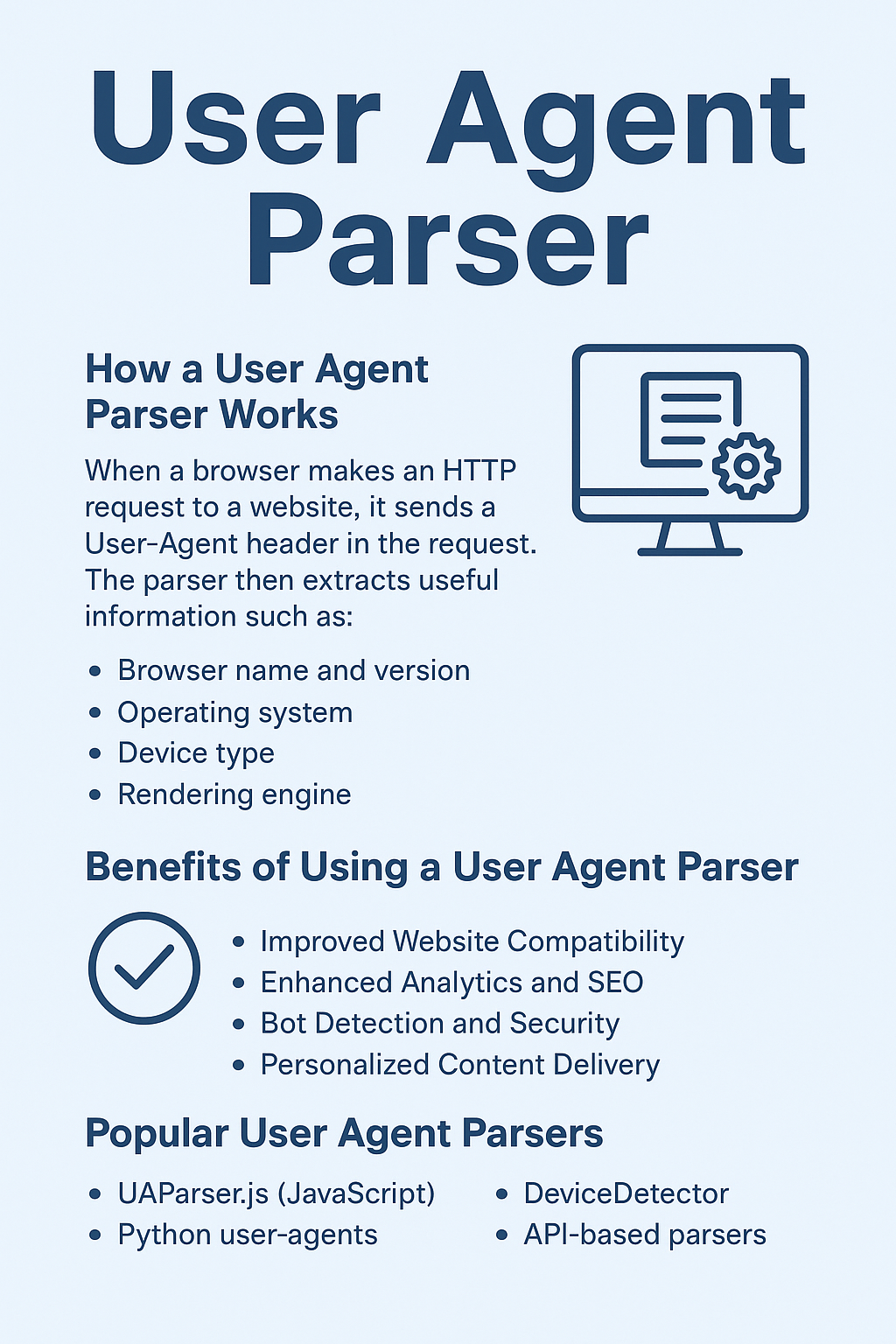
User agent parser
Created on 5 October, 2025 • Developer Tools • 79 views • 2 minutes read
Learn what a User Agent Parser is, how it works, and why it’s essential for web optimization, analytics, and SEO. Understand browsers, devices, and user behavior with precision.
User Agent Parser: Understanding and Optimizing Web User DataWhat Is a User Agent Parser?
A User Agent Parser is a powerful tool that identifies and interprets information from a user's web browser, operating system, and device. Every time a user visits a website, their browser sends a “User-Agent string” — a small piece of text that contains details about their environment. This string helps web servers deliver optimized content based on the device type, browser version, and platform.
A User-Agent Parser takes this complex string and breaks it down into readable components. For example, it can tell whether a visitor is browsing from Chrome on Windows, Safari on iPhone, or Firefox on Linux. This makes it an essential tool for web developers, SEO specialists, and analytics professionals.
How a User Agent Parser Works
When a browser makes an HTTP request to a website, it sends a User-Agent header in the request. The parser then extracts useful information such as:
Browser name and version (e.g., Chrome 127.0.0.1)
Operating system (e.g., Windows 10, macOS, Android)
Device type (e.g., desktop, tablet, smartphone, bot)
Rendering engine (e.g., Blink, WebKit, Gecko)
For example, a User-Agent string might look like this:
Mozilla/5.0 (Windows NT 10.0; Win64; x64) AppleWebKit/537.36
(KHTML, like Gecko) Chrome/117.0.0.0 Safari/537.36
A parser reads this and outputs structured data such as:
Browser: Chrome
Version: 117.0
OS: Windows 10
Device: Desktop
Benefits of Using a User Agent Parser
1. Improved Website Compatibility
By knowing what browsers and devices your visitors use, developers can ensure better compatibility and deliver a smoother browsing experience.
2. Enhanced Analytics and SEO
User Agent parsing helps track how users interact with your site across devices. Understanding user behavior on mobile vs desktop can guide SEO optimization and responsive design improvements.
3. Bot Detection and Security
Many bots, crawlers, and scrapers send unique User-Agent strings. A parser can help identify and filter out unwanted traffic, improving website security and analytics accuracy.
4. Personalized Content Delivery
Websites can dynamically adjust their layout or content based on the detected device. For instance, serving lightweight images to mobile users or advanced features to desktop browsers.
Popular User Agent Parsers
Several libraries and APIs make it easy to parse User-Agent strings:
UAParser.js (JavaScript) – Ideal for client-side detection.
Python user-agents – Great for backend analytics or log analysis.
DeviceDetector – A comprehensive parser that also detects bots and apps.
API-based parsers – Online tools that provide real-time parsing for web applications.
Conclusion
A User Agent Parser is more than just a technical utility — it’s a vital component in delivering tailored, optimized web experiences. By understanding your visitors’ browsers, devices, and platforms, you can improve SEO performance, enhance user engagement, and strengthen website security.
In today’s digital landscape, where users browse from a wide range of devices, integrating a reliable User Agent Parser ensures your website stays compatible, fast, and user-friendly across all platforms.
Popular posts
-
Barcode readerMisc Tools • 160 views
-
Color pickerMisc Tools • 122 views
-
Exif readerMisc Tools • 117 views
-
SHA-256 generatorGenerator tools • 93 views
-
Ip LookupChecker Tools • 90 views